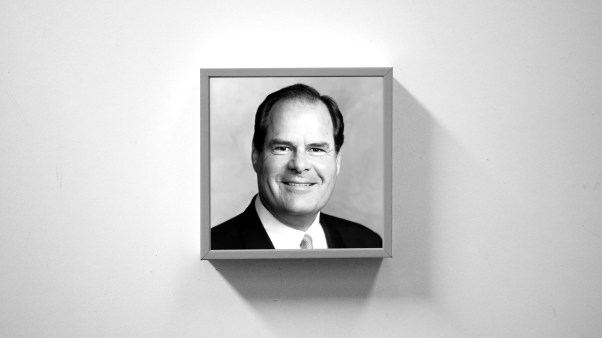Inauguration of a U. S. President traditionally carries religious overtones. The religious elements are mostly ceremonial, such as the use of the Bible in taking the oath of office, and participation of clergymen offering prayers. Occasionally, however, the inaugural proceedings take a spontaneous and dramatic spiritual turn, as when President Eisenhower ventured an impromptu prayer in 1953, or when President Truman quoted Solomon’s prayer of dedication in 1949. (Aside: When Truman initially took office upon the sudden death of President Roosevelt in 1945, he was so moved with the realization of his new responsibilities that he even asked newsmen to “pray for me.”)
This week, new interest focused on the religious phase of the inauguration through the fact that the incoming president is the first Roman Catholic ever elected to the nation’s highest office.
It has always been the custom for the new President to take the oath of office with his hand raised over a Bible, though this is not a requirement of the Constitution. Neither does the Constitution stipulate that the President swear to the oath. He may affirm instead. Franklin Pierce, an Episcopalian, was the only President to avail himself of that alternative.
Accordingly, the President may specify which Bible is to be used, and President-elect Kennedy has chosen the Douay, or Roman Catholic version. He will take the oath over a 15-pound Kennedy family Bible owned by an uncle, Thomas A. Fitzgerald of Dorchester, Massachusetts.
Usually the President requests that the Bible be opened to a favorite passage.
When George Washington was inaugurated in 1789, a Bible was secured hurriedly and apparently opened at random to the 49th and 50th chapters of Genesis. Andrew Johnson took his oath of office with his hand resting on the 21st chapter of Proverbs. Others chose passages as follows: Grant, Isaiah 11; Hayes, Psalm 118; McKinley, Proverbs 16:21, 22; and Franklin D. Roosevelt, 1 Corinthians 8 and 13.
Several Presidents did not take their oaths on the Bible. These included Coolidge and Theodore Roosevelt, both of whom were sworn in hastily following the deaths of their predecessors.
Some presidents used more than one Bible. In addition to a King James Version, Truman used a replica of the Latin Gutenberg Bible and an American Standard Version (1901).
Eisenhower in 1953 used the George Washington Bible and a personal Bible given to him by his mother on his graduation from West Point. The Washington Bible was opened at Psalm 127:1; his own Bible at 2 Chronicles 7:14. In 1957 he used only the Bible given by his mother, opened at Psalm 33:12.
Kennedy last month was asked to give the Bible public recognition beyond the measure of its use at the inauguration. William I. Nichols, editor and publisher of This Week magazine, urged the President-elect to proclaim 1961 as “Bible Anniversary Year.”
“Such a proclamation,” declared an open letter published in the Christmas issue of the weekly newspaper supplement,” would invite the churches of every denomination as well as all agencies of communications to cooperate in making the year 1961 a time when old truths are rekindled in our hearts.”
The Cabinet
President-elect John F. Kennedy’s Cabinet nominees include seven Protestants, two Jews, and a Roman Catholic.
Protestant nominees include two Presbyterians, two Methodists, a Lutheran, an Episcopalian, and a Mormon.
The lone Roman Catholic is the President-elect’s brother Robert, named to be Attorney General.
Dr. Dean Rusk, nominee for Secretary of State, is the son of a minister of the Presbyterian Church in the U. S. Rusk himself is a member of the Hitchcock Memorial Presbyterian Church in Scarsdale, New York.
The incoming Secretary of Defense, Robert S. McNamara, 44, is an elder of the First Presbyterian Church of Ann Arbor, Michigan.
C. Douglas Dillon, nominated to be Secretary of the Treasury, belongs to the Protestant Episcopal Church.
The next Postmaster General, J. Edward Day, is a member of the official board of the Wilshire Methodist Church in Los Angeles.
Governor Orville Freeman of Minnesota, appointed Secretary of Agriculture, is active in the Augustana Lutheran Church.
Representative Stewart L. Udall of Arizona, selected as Secretary of the Interior, is a member of the Church of Jesus Christ of the Latter-day Saints (Mormon).
Both Arthur J. Goldberg, who will be Secretary of Labor, and Connecticut Governor Abraham A. Ribicoff, chosen Secretary of Health, Education, and Welfare, are members of Reform Jewish congregations.
Nichols noted that the 1961 observance would be particularly timely because the year marks the anniversaries of a number of Bible editions, including the King James Version (350th), the Revised Edition of the New Testament (80th), and the American Standard Version (60th). Nichols also observed that 1960 marked the 350th anniversary of the Douay translation of the whole Bible, and that 1961 will see publication of the New Testament portion of the New English Bible.
Representatives of four major religious bodies will participate in the Kennedy inauguration on January 20.
Kennedy will follow the precedent established by President Eisenhower in 1957 by inviting a prelate of the Eastern Orthodox church to join Protestant, Catholic, and Jewish churchmen in invoking God’s blessing.
Richard Cardinal Cushing of Boston will give the invocation. Prayers will be offered also by Archbishop Iakovos, head of the Greek Orthodox Archdiocese of North and South America, and Dr. John Barclay, pastor of the Central Christian Church of Austin, Texas, where Vice President-elect Lyndon B. Johnson is a member. The benediction will be pronounced by Rabbi Nelson Glueck, president of Hebrew Union College in Cincinnati.
‘Deceptive’ Bible Study
The Federal Trade Commission says that sponsors of a Bible correspondence course have agreed to drop the labels of “accredited nonprofit residence schools.”
An FTC complaint issued last summer charged that three affiliated companies in Rockford, Illinois, deceptively used the words “academy,” “seminary,” and “institute” in their corporate or trade names. The complaint was directed against the Colonial Academy, Inc., the Pioneer Theological Seminary, and the National Association of Bible Schools, and against Carl and Verna Hansen, officers of the schools.
“Contrary to respondents’ representations,” the complaint declared, “Colonial Academy and Pioneer Seminary are profit-making organizations, and are not residence schools; they are not old, established reputable schools; their diplomas are not recognized by any institution, agency, or organization; persons awarded such diplomas are neither entitled to nor will receive the same honors, rights, and privileges as persons holding diplomas from properly accredited schools; and their honorary diplomas are given to anyone willing and able to pay for them and are not conferred for educational or ministerial achievements.”
The FTC charged that the “National Association of Bible Schools” is not “a recognized accrediting agency, as claimed, but is merely “a corporation organized by the officers in an attempt to give respectability to their own correspondence schools.”
The respondents’ agreement to discontinue these and “other misrepresentations,” the FTC said, was for purposes of settling the case and “does not constitute an admission that they have violated the law.”
Studying Buddhism
Latest federal grants made under the National Defense Education Act include support for a program at the University of Wisconsin for graduate study of Buddhism. The awards are made to Ph.D. candidates intending to teach at secular colleges. A number are pursuing studies in Christian theology, ethics, and philosophy.
Bibles in Class?
Nearly three out of four public school superintendents polled by an educational magazine say they favor Bible readings in the classroom.
The Nation’s Schools, a professional journal, had asked: “Do you believe that reading from the Bible (any Christian version)—without interpretation or comment—should be permitted in the public school classrooms?”
Seventy-two per cent replied favorably. Twenty-eight per cent said they were opposed.
Evangelism in the Sun
Billy Graham’s state-wide evangelistic effort now beginning in Florida may even reach to sun-loving Northerners.
By scheduling meetings at the height of the tourist season, the evangelist hopes to proclaim the redeeming Christ before winter vacationers as well as resident Floridians.
Following the crusade opener, a week-end series in Jacksonville January 14–15, Graham travels on succeeding week-ends to Orlando, Clearwater, St. Petersburg, Tampa, Bradenton, Sarasota, Tallahassee, and Gainesville. Additional crusade meetings will be conducted by associate evangelists Grady Wilson, Leighton Ford, and Roy Gustafson.
The Florida crusade will be climaxed with a 22-day campaign in the air-conditioned Miami Beach Convention Hall, largest in the South, beginning Sunday, March 5.
Dr. Paul A. Meigs, director of evangelism for the Florida Baptist Conference, is general chairman of the state-wide crusade committee.
Reviewing Relations
The top administrator of the American Baptist Convention indicates he will support an overture by a Southern Baptist editor to “review relations” between Baptist bodies in America.
Such a review is “certainly in order,” says Dr. Edwin H. Tuller, who is general secretary of the American Baptist Convention.
The Rev. J. Marse Grant, editor of the Biblical Recorder, official journal of the Baptist State Convention of North Carolina, carried an editorial in the publication’s December 17 issue calling for discussions with other Baptist bodies as a possible way to provide “a strong Baptist witness in America.” He cited exploratory talks with the American Baptist Convention as a first step.
Tuller agreed with Grant that Baptists should not ignore the merger of four major denominations proposed last month by Dr. Eugene Carson Blake. While advocating talks, Tuller added he was not sure whether organic union of the two Baptist bodies would be the best way to achieve a stronger Baptist witness in America.
Lutheran Cooperation
Formal negotiations between the two major elements of U. S. Lutheranism are proving so fruitful that both parties are enthusiastic about a continuation. Thus far, two meetings have been held between representatives of the National Lutheran Council and the Lutheran Church—Missouri Synod. A third is now tentatively scheduled for next August in Chicago.
The talks revolve around theological issues involved in Lutheran cooperative activities. At the latest session there was “substantial agreement on the significance and nature of confessional subscription.” Following nearly six hours of discussion, the 29 conferees issued a prepared statement which said:
“Substantial agreement was reached with reference to (1) designation of the confessions which are involved in subscription; (2) assertion of historical limitations in the confessions; (3) allowance of distinction between the primary norm of the Scriptures and the secondary norm of the confessions; (4) recognition that the heart of the confessions is their witness to the Gospel; (5) acknowledgment that this understanding of the Gospel requires rejection of contradictory understandings; and (6) affirmation of the importance of confessional subscription for the proclamation of the Church.”
Conferees had focused their attention upon traditional adherence of Lutheran churches to doctrinal statements contained in the Book of Concord, the collection of confessional documents which form the basis of the teaching and practice of Lutherans around the world. (Best known of the documents are the three chief creeds of the Christian faith—Apostles’ Creed, Nicene Creed, and Athanasian Creed—Luther’s Large and Small Catechisms, and the Augsburg Confession and Apology authored by Philip Melanchthon.)
Scheduled for discussion at the meeting next year is the general topic, “What kind of cooperation is possible in view of the discussions to date?” Topics to be considered will include the relation of cooperation to confessional agreement, the relation of witness to cooperation, and the extent of cooperation apart from pulpit and altar fellowship.
Publication of four essays read at the first two meetings is planned shortly. They will be made available to every Lutheran pastor in America. Essayists included Professors Theodore G. Tappert (for the NLC) and Herbert J. A. Bouman (for the Missouri synod).
Christian Statesman
Dr. Charles Malik of Lebanon, former president of the U. N. General Assembly and one of the world’s best-known Christian statesmen, becomes a professor at Methodist-related American University in Washington, D. C. this month.
Malik, a Greek Orthodox layman, was appointed to a professorship in the university’s School of International Service. He will also lecture in the departments of religion and philosophy and will conduct faculty seminars in international relations. Plans are under way to invite teachers and students from other Washington colleges to study under Malik on a cooperative basis.
United Presbyterian agencies are sharing costs involved in the appointment. Malik has had most of his Protestant relationships through Presbyterians, who have conducted missionary work in Lebanon for more than 100 years.
Malik received his B. A. degree at the American University of Beirut in 1927 and his M. A. and Ph.D. degrees at Harvard in 1937. He also studied at the University of Freiburg, Germany, in 1935 and 1936.
Malik served as Ambassador of Lebanon to the United States in 1945–46 and again from 1951–56. He was a member of his country’s delegation to the United Nations from 1945 until 1954 and from 1957 until 1959. He was elected president of the thirteenth U. N. General Assembly in 1959.
More recently he has served as visiting professor at Dartmouth College, Hanover, New Hampshire, and last summer taught at Harvard.
Sidelined Again
Dr. Thomas A. Dooley, noted Roman Catholic jungle physician of Laos, is back in the United States for treatment of a spinal ailment. Dooley, 33-year-old co-founder of the Medical International Cooperation Organization (MEDICO), underwent an operation in New York 16 months ago for the removal of a cancerous tumor of the chest.
People: Words And Events
Deaths:Archbishop Flavian, 82, leader of the Old Believers, a sect that split from the Russian Orthodox Church; in Moscow … Ernest Lloyd Branson, 54, former Seventh-day Adventist missionary; in Los Angeles.
Appointments: As Protestant cadet chaplain at the Air Force Academy, Chaplain (Lieutenant Colonel) George J. Cameron, a Methodist … as executive vice president of King’s College, Dwight Ryther … as editor of the Lutheran Companion, Paul E. Gustafson … as editor of The Mennonite, the Rev. Maynard Shelly … as pastor of the Hamburg (New York) Presbyterian Church, the Rev. Gary Demarest, formerly program director for the Fellowship of Christian Athletes, Inc.
Elections: As general secretary of the Methodist General Board of Christian Social Concerns, Dr. Caradine R. Hooton … as executive secretary of the Japan International Christian University Foundation, Dr. Henry G. Bovenkerk … as first bishop of the Lutheran Church of Northern Tanganyika, the Rev. Stefano R. Moshi.










